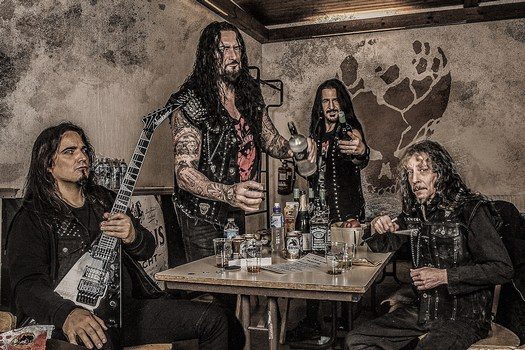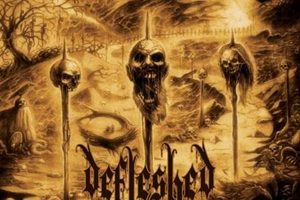Destruction – Drowning in Chaos
Sunday, 11th August 2019
Touring globally like never before, these are thriving times for Destruction. Consistently delivering blistering thrash to the metal hordes, their catalog contains gems from the early Infernal Overkill/ Eternal Devastation days on through to their latest efforts like Under Attack and this year’s Born to Perish. Now expanding the lineup to a quartet and welcoming drummer Randy Black and second guitarist Damir Eskic – the new record contains more twin harmonies, guitar interplay, and powerful punch to the proceedings while still being 100% Destruction.
On a blitzkrieg press junket for the new record, we were able to speak to bassist/vocalist Schmier. You’ll learn more about the punchy nature to this latest record, his thoughts on the crazy politicians in the world and what the common people need to think about for the future of the planet, thoughts on the regeneration and popularity of thrash, plus some interesting documentary/book talk.
Dead Rhetoric: Born to Perish is the latest Destruction album – beyond expanding the lineup to a quartet again and changing out drummers, what major differences do you think took place to make this recording stand out compared to previous records?
Schmier: We always try to make the best record that we can in this moment you know- you always have these circumstances that take place around the band and you have to make the best out of it. We have a lot of good chemistry in the band, and listening to the last few releases that influences the future of the next one, to avoid certain mistakes. This time we had a very good flow, we were very inspired to write the new material with the new lineup. I didn’t write songs for two years. The album is more punchy than the last one, it goes more back to the roots- more solos, more leads, more shredding – especially now that we have two guitars now. What I realized is that these songs will also work very good live.
Dead Rhetoric: What is it like for Mike to now have a second guitar player in the band?
Schmier: I think it’s a relief. He had a lot pressure on his back for the last twenty years, but also at the same time it can be inspiring. The two guitarists, it’s a give and take. Damir is a very good guitar player and a shredder, he can play everything but he has to learn some things from Mike – Mike is a master too and he’s developed a certain style of picking with the band. They are pushing each other, even though I am the bass player I am a big fan of the guitar and they both color the album to the max.
Dead Rhetoric: With the song “Fatal Flight 17”, you pay tribute to Gary Moore with a personal story. Can you discuss what Gary meant to you as a person and the music that he created, as there was plenty of phenomenal compositions in his career as a solo artist and with Thin Lizzy?
Schmier: Oh yeah. I got into Gary when he was in Thin Lizzy, and when he started his solo career I kept on following him. In the 1980’s, “Murder in the Skies” was a very special song of his, a plane got shot down over the sea of Japan, it was a very tragic moment. The song always reminded me of this terrible accident. It became my favorite song in Gary Moore’s history. I’m not such a big fan of when he started to play the blues, I was a little sad. For me he was a hard rock guitarist – I thought he was very interesting in metal and hard rock.
The “Fatal Flight 17” is also a song about a plane crash, or a plane that got shot down over the Ukraine. That’s what the lyrics are all about – and a friend of mine had a friend aboard that plane, that’s what makes it even more tragic.
Dead Rhetoric: In the bio you mention the album being a statement against power-hungry politicians and their insatiable greed to attain more money/power, often at the expense of others who voted for them in the first place. What can the common person do today to take back control and stop this madness from continuing?
Schmier: I don’t know. We are so blind, we don’t see shit. I just saw a documentary right now, all the glaciers are melting. It’s proven that there is a sign of global warming. It’s just sad to see that we see the houses on fire. It’s all about the industries going out to make more money. What about giving some happiness to the world. This planet will drown in chaos soon, we will leave a planet destroyed to the next generation of our kids. It’s time to stop this – in Europe we have people that are concerned on the streets with demonstrations. Maybe it’s a good idea, but these political parties also raise the taxes which can be difficult for the common people to handle. We need a whole change of politicians and of the system. It’s not working anymore. Look at China, they are starting to really look at the Western ways of making money – and they are destroying the whole country with pollution. The politicians have to start taking care of the people, not just themselves, and then we will have a future for this planet.
Dead Rhetoric: Gyula Havancsák is the cover artist once again – and has been a part of the Destruction artistry since 2005 with Inventor of Evil. What do you enjoy most about his work for the band – and what was the idea behind his creativity for the new album?
Schmier: We wanted something different this time. He’s a great artist because he’s a metalhead – he has been working for us for so many years, he understands the band really well. I come up with an idea or a draft, he really picks up on it very quick. He makes it his own. This album was a difficult one I thought because it’s something that he has never done before. He used this coat of arms, and the look of a patch- we wanted something simple, but hard hitting with a strong image. I wasn’t sure he could do that, but once I saw the first idea I was thrilled. He creates amazing stuff – he understands the band he works for really well. He’s very good at dark art, he works very fast. I don’t know how he does it. We work very closely together- I send him the lyrics and the songs before the release so he can work well.
Dead Rhetoric: Where do you see the status of thrash metal worldwide in terms of creativity and popularity – would you say that its more popular than its ever been, even during the mid to late 80’s first wave?
Schmier: I think the first wave was very special because it created bands like Metallica. What we have right now though is more than just a reunion- there is a whole new generation of thrashers and there’s so many new younger bands. There’s a whole bunch of bands now when we go out on tour like Exmortus, Warbringer, Havok, Municipal Waste- and a new generation of younger bands that people don’t even know yet. Maybe you can find their demos on YouTube – sometimes when we play shows, we have local support, and especially in Latin countries all the local supporters are thrash bands, and they are killer. That shows me that thrash has a future and once the old bands will retire, there’s no fear of the next generation stepping up.
Dead Rhetoric: The metal festival season seems to be getting longer and stronger from an outsider perspective across Europe. Do you have any worries or concerns about the longevity and sustainability, and do you enjoy the differences between festivals and regular club/theater tours?
Schmier: Nothing is better than playing in the club. For me, that’s the best atmosphere- people are closer, the feeling is tighter, festivals when there is a strong wind the sound swirls and you can’t hear shit. But of course, festivals are a unity thing- you see all the fans from around the world, people are traveling far distances to festivals and you meet all the bands, I like the community of the festivals. It’s amazing to play in front of 50,000 people, but it becomes more anonymous when you play in front of that many people. A lot of people stare at your face.
We have a lot of festivals here in Europe that are growing bigger and bigger – a lot of smaller festivals coming out too. For a while, some places were dying because there were too many festivals. At the moment, it’s crazy because all the festivals are surviving – even the smaller ones that have 2,000-5,000 people attending. They stay strong and are sold out. What we see is on the touring manner, a lot of tours aren’t going so strong in Europe because there are too many bands. Everyone wants to come here to make money, and people don’t have the money to pay for all these shows and tours. Sometimes you’ll go to a show, there will be a couple of amazing bands, and there will only be 200-300 people instead of 2,000-3,000. That wasn’t the case back ten years ago. I understand people that go to festivals though, for a small budget you get so many bands, and a lot of fun of course.
Dead Rhetoric: Are there any signs of Destruction slowing down, especially now as Mike and yourself are in your 50’s – or does the desire to create and perform within the band only grow stronger with time?
Schmier: I hope the new album shows that we still have the desire, the passion and the power to continue. Age is only a number, and if you start to feel the age at a certain point you just have to adjust your body. Certain stuff you can’t do as much anymore, we don’t party as crazy as we used to. We learned this back in the day when The Rolling Stones stopped partying. We are more moderate on tour, but we still have the passion for the music. We still love this and have since day one, and hopefully we can do this for many more years.
Dead Rhetoric: Where do you see the state of the metal music industry – are record companies working more hand in hand with artists to allow more freedom and expression to benefit all parties, especially considering the changing tides of consumer consumption with digital distribution and streaming/ social media platforms?
Schmier: I luckily learned that I had to adjust to the system and learn (about) this other media. I know a lot of people my age don’t care about this modern media, but I learned Instagram and how all the media portals work. It gives me a good update on the band. It’s great on one point because you reach many people very quick, but on the other side we all know the bands don’t get paid shit nowadays, streaming is even bad for pay and YouTube is not paying very much.
On the other side, the records are still selling in Europe – we still have physical sales. In America, sales are down – but in Europe especially vinyl sales, we had the strongest year in sales in 2018 for thirty years. We have always done well with the labels – the production, cover, promotion, it’s a good hand in hand work.
Dead Rhetoric: When you look at the entire Destruction catalog, what are the records that you are most proud of or resonate with you strongly – and what would you consider the most underrated or underappreciated one that maybe listeners need to go back to and dig deeper into?
Schmier: Hmm, every record is very personal. It shows the moment the band was in when they wrote it. I always compare it as a Dad, imagine if you have thirteen kids, which is your favorite? Is it the crazy kid that loves trouble, or is it the nice kid fulfilling every dream for his father? The benchmarks are the early albums as we were able to achieve a certain level of success in a very short amount of time, the comeback albums All Hell Breaks Loose and The Antichrist, we were a big band again – something that we didn’t think would happen for many years. And also the new album is an important step, as we are a four-piece again, the new members and fresh blood in the band.
An album that I think is underrated – that’s difficult. The albums that get the most recognition are the fan favorites. The most diverse album is Release from Agony – it was the most successful album in the United States on one point, and people love it over there. But in Europe – the people had a diverse reaction to it. Release from Agony is loved on one side of the world, and people don’t like it as much on the other side.
Dead Rhetoric: How much fun is it to revisit the old material on the two Thrash Anthems albums?
Schmier: Every band should do this. Once you move away from your roots, you forget about this. Even if you play this material live, it’s not the same as when you record these songs. You understand the songs better. I had to rewrite some of the lyrics because I didn’t have them anymore. We didn’t do lyric sheets and nothing was digitalized back in the day. The lyrics I found on the internet were the wrong lyrics, basically. I had to re-create the lyrics, and it was very interesting. A lot of memories came flooding back, and for us as a band it’s great because it brings back songs in the setlist that we would never play anymore. You can reconnect to your past. Our past is a very important part of our history.
Dead Rhetoric: Is it a challenge to come up with the right setlists in a festival setting versus your headline shows?
Schmier: There are some classics that work everywhere. Some songs we dig out in countries that we know like those songs more. We can finally play some songs now from Release from Agony again, because it was very difficult before with only one guitar. The setlist is a problem for me now more and more at the festivals. We usually get one hour, but sometimes when you play a bigger festival you only get 45 minutes- and that’s a problem for me. How do you get 35 years of Destruction into a 45 minute set, it’s impossible.
Dead Rhetoric: What’s on the agenda for Destruction over the coming year or two? Would you ever consider developing an autobiography in book form about your life or have someone capture the history of Destruction in this format?
Schmier: We have two interesting things going. We have a German film team that will be following us on the road for the next two years, for this album. We are hoping that this film will end with a show with Kreator, Sodom, and Destruction- the grand finale of the movie. We hope to get some backing information to the fans for this movie. And also I am writing a book – I have been working on this for the past two years. Also from home, laying on the beach – it’s fun to go back and remember how things were back in the day. I have to do this now, I’m at the point where I’m still fit in my head and I can still remember this material. I want to see within the next year how far I’ll go – it’s interesting. The question is, how much do you reveal? If you write the truth, you may insult some of your friends- I might just tell stories that are not meant for public release.
We start in Europe in September with Overkill and Flotsam and Jetsam, and there are more festivals this year. We will tour early next year, and we are in talks with agents in America at the moment. We hope to come back to the states in March or April of 2020, and we will go to Asia and do a headline thing in Europe in February.




























